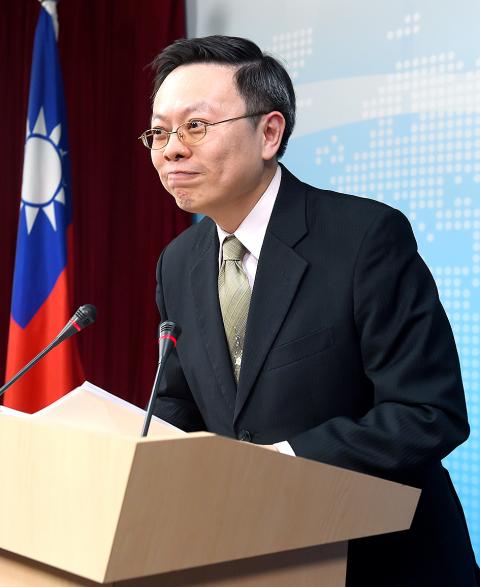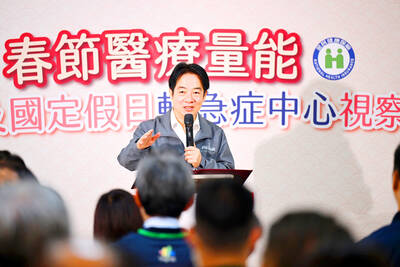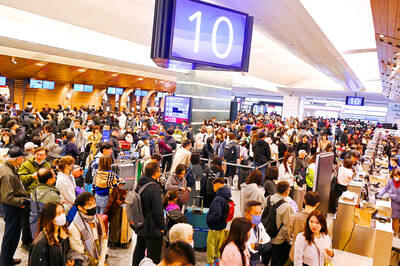Mainland Affairs Council (MAC) Minister Wang Yu-chi (王郁琦) yesterday offered his resignation after prosecutors decided not to indict former deputy minister Chang Hsien-yao (張顯耀) on charges of leaking confidential information to China, despite Wang’s testimony that he had done so.
The Taipei Prosecutors’ Office announced earlier in the day that it had closed the case because there was not enough evidence to support the allegations.
“After a thorough investigation over the past five months, there was insufficient evidence to indicate Chang Hsien-yao had revealed to the Chinese government our government’s bargaining priorities and bottom-line conditions [on negotiations],” the office said in a statement

Photo: Chien Jung-feng, Taipei Times
The information allegedly leaked consisted of normal documents and information on visitors’ itineraries and could not be construed as secret information, the office said.
Although Wang had testified that he was told by Taiwanese businesspeople in China that “Chang Hsien-yao was close to Chinese officials and that problems could occur in the future,” prosecutors said they could not indict Chang Hsien-yao or others simply on “hearsay.”
Chang Hsien-yao has denied allegations that he used his secretary Chang Su-ling (張素玲) and assistant Chen Hung-yi (陳宏義), who also worked for the E-United Group (義聯集團), to make telephone calls and send text messages and e-mails to provide information to Beijing between June 2012 and February last year.
Wang called a news conference at 12:30pm to voice his disapproval of the prosecutors’ decision. Repeatedly saying that he found the rationale for not indicting Chang Hsien-yao “unacceptable,” Wang said Chang had engaged in the “inappropriate divulging of information.”
The prosecutors’ statement showed that they had evidence with regard to his accusation, Wang said, without elaborating.
“Chang Hsien-yao might have acted in a way that shielded him from legal liability, but as a prominent political appointee responsible for handling cross-strait issues, what he did overstepped the bounds of propriety,” Wang said.
Pressed by reporters, Wang refused to say what information had allegedly been leaked and to whom.
He only said Chang Hsien-yao passed classified documents to China via a Taiwanese businessperson who has investments in China before the two sides were about to start negotiations on that issue. He said the businessperson had told him about the handovers in the first half of last year, but that he did not take the information seriously because of a lack of evidence.
It was not until late July last year that he mentioned the allegations to then-National Security Council secretary-general King Pu-tsung (金溥聰), who informed him days later that the national security agencies had corroborated the information, Wang said.
Wang said he disagreed with the prosecutors’ view that Chang Hsien-yao had not intended to reveal confidential information when he asked his driver, surnamed Lee (李), Chen and Chang Su-ling to keep the information he gave them in both paper and electronic forms.
“The Mainland Affairs Council has determined that the information was classified, but the prosecutors said it was not. Could it be that we might just as well give such information to China in the future? It does not make any sense that prosecutors did not consider divulging state secrets to people in the private sector to be illegal,” Wang said.
Wang said that he had no regrets over how he had handled the case and if he had to do it all over again, he would act the same way, even if it meant he would have to resign himself.
The Executive Yuan announced on Aug. 16 last year that Chang had resigned for “family reasons.”
However, the following day Chang issued a statement that said he had been forced to resign. The council then announced that he was being investigated for violating the National Security Act (國家安全法) for allegedly leaking information to China and that it had turned the case over to the prosecutors.
Meanwhile, Presidential Office spokesperson Ma Wei-kuo (馬瑋國) said the office stood by Wang in his handling of the case and had no further comments.
Sources said that former Straits Exchange Foundation vice chairman Kao Koong-lian (高孔廉) could succeed Wang if the minister’s resignation is accepted.
Chinese Nationalist Party (KMT) deputy caucus whip Liao Kuo-tung (廖國棟) said that it would be inappropriate for the caucus to comment on Wang’s offer to resign.
“It is true that Wang [vowed to step down if Chang Hsien-yao was not prosecuted], but what the Cabinet needs now is stability. I hope he would take the overall picture into consideration,” Liao said. “This is not the time for anyone to leave [the Cabinet].”
KMT Legislator Wu Yu-sheng (吳育昇) downplayed rumors that Wang wanted to resign because he was also tired of dealing with the controversy over China’s declaration of new aviation routes over the Taiwan Strait and the cancelation of a scheduled meeting with China’s Taiwan Affairs Office Minister Zhang Zhijun (張志軍).
“He resigned purely over the decision not to prosecute. If he did not resign, I think, President Ma and King [who resigned last week] would be the ones to face repercussions. He [Wang] is acting as a firewall,” Wu said.
Additional reporting by Jason Pan, Alison Hsiao and Wang Yu-chung

NON-NEGOTIABLE: The US president’s action ran counter to one of the US’ ‘six assurances’ on not consulting China about arms sales to Taiwan, US lawmakers said US President Donald Trump’s admission that he is discussing arms sales to Taiwan with Chinese President Xi Jinping (習近平) is “alarming and a blatant violation of US policy and the six assurances,” US Representative Ro Khanna said on Tuesday. Trump on Monday said he would decide soon on whether to send more weapons to Taiwan, after Xi warned him not to do so. “I’m talking to him about it. We had a good conversation, and we’ll make a determination pretty soon,” Trump told reporters aboard Air Force One when asked about warnings raised by Beijing during a phone call with Xi over

REAL EMERGENCIES: To avoid overcrowding, the health minister urged people with mild or moderate symptoms to go to UCCs, while the ER should be for critical cases President William Lai (賴清德) yesterday inspected the nation’s Lunar New Year medical preparedness with a visit to an urgent care center (UCC) in Taipei and expressed confidence in the Ministry of Health and Welfare’s plans to prevent emergency room (ER) overcrowding during the nine-day holiday. The ministry in November last year launched a pilot UCC program to provide urgent medical care at 13 clinics in the nation’s six special municipalities over weekends and on holidays, aimed at relieving pressure on crowded ERs. To ease ER overcrowding during the Lunar New Year, when most hospitals and primary care clinics are closed, the National

HOLIDAY RUSH: Airport passenger volume is expected to reach a new high, while southbound road traffic would likely peak from Tuesday As Lunar New Year travelers flock overseas, passenger traffic at Taiwan Taoyuan International Airport is expected to shatter records, as Taoyuan International Airport Corp (TIAC, 桃園國際機場), Taiwan’s largest aviation hub operator, projected yesterday’s passenger volume to climb to 167,000. The figure comes after a record single-day high of 161,000 passengers on Thursday, and would surpass the previous pre-COVID-19 pandemic Lunar New Year peak of 166,000 passengers in 2019, TIAC said. Long lines could be seen forming as early as 7am yesterday, filling Terminal 1 of the airport almost to capacity, yet security checks took only 10 to 15 minutes. TIAC urged

VACILLATING? Some US officials are concerned that Trump’s April visit to Beijing might be affected if Washington pushes through additional weapons sales to Taiwan A major US arms sales package for Taiwan is in limbo following pressure from Chinese President Xi Jinping (習近平) and concerns among some US officials that greenlighting the deal would derail US President Donald Trump’s upcoming visit to Bejing, the Wall Street Journal (WSJ) reported on Wednesday. Trump on Monday said that he would decide soon on whether to send more weapons to Taiwan, after Xi warned him not to do so. “I’m talking to him about it. We had a good conversation, and we’ll make a determination pretty soon,” Trump told reporters aboard Air Force One when asked about warnings raised